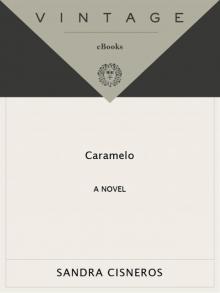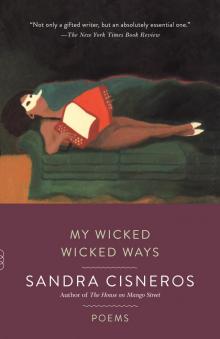- Home
- Sandra Cisneros
Have You Seen Marie?
Have You Seen Marie? Read online
THIS IS A BORZOI BOOK PUBLISHED BY ALFRED A. KNOPF
Copyright © 2012 by Sandra Cisneros
Illustrations copyright © 2012 by Ester Hernández
All rights reserved. Published in the United States by Alfred A. Knopf, a division of Random House, Inc., New York, and in Canada by Random House of Canada Limited, Toronto.
www.aaknopf.com
Knopf, Borzoi Books, and the colophon are registered trademarks of Random House, Inc.
Grateful acknowledgment is made to Elena Poniatowska for permission to reprint an excerpt from La Flor de Lis, copyright © 1998 by Elena Poniatowska. Published by ERA, Mexico DF. Reprinted by permission of Elena Poniatowska.
Library of Congress Cataloging-in-Publication Data
Cisneros, Sandra.
Have you seen Marie? / by Sandra Cisneros; illustrated by Ester Hernández. — 1st ed.
p. cm.
“This is a Borzoi book.”
eISBN: 978-0-307-96086-3
I. Hernández, Ester, 1944– II. Title.
PS3553.I78H38 2012813’.54—dc23
2012003532
This is a work of fiction. Names, characters, places, and incidents either are the product of the author’s imagination or are used fictitiously. Any resemblance to actual persons, living or dead, events, or locales is entirely coincidental.
Jacket illustration by Ester Hernández
Jacket design by Kelly Blair
v3.1
For my brothers,
and…
Para aquellos sin madre, ni padre, ni perro que les ladre.
For those without a mother, without a father, without even a dog to make a bother.
Contents
Cover
Title Page
Copyright
Dedication
First Page
Afterword
Acknowledgments
A Note About the Author
Other Books by This Author
Es entonces cuando te pregunto, mamá, mi madre, mi corazón, mi madre, mi corazón, mi madre, mamá, la tristeza que siento. ¿Ésa dónde la pongo?
¿Dónde, mamá?
It’s then I ask you, mama, my mother, my heart, my mother, my heart, my mother, mama, the sadness I feel. Where do I put it?
Where, mama?
—ELENA PONIATOWSKA,
La Flor de Lis
The day Marie and Rosalind
arrived on a visit from Tacoma
was the day Marie ran off.
It had taken three days of driving
to get to San Antonio, and Marie
had cried the whole way.
I felt like crying and taking off, too.
My mother had died a few months
before. I was fifty-three years old and
felt like an orphan.
I was an orphan.
Every day I woke up and felt like a
glove left behind at the bus station. I
didn’t know I would feel this way.
Nobody told me.
I’d been hiding in my house since.
Most days I didn’t even comb my
hair, and most days I didn’t care.
The thought of talking to people
made me feel woozy.
And now Rosalind was here, and
Marie was gone, and I was the
only person Rosalind knew in all
of Texas. I put on my shoes and
grabbed my house keys.
I followed Roz up and down the streets
of my neighborhood and along both banks
of the San Antonio River.
We asked the neighbors.
We put up flyers.
“Have you seen Marie?”
The Reverend Chavana, who lives in the corner house across the street, said he hadn’t seen any new cats around, but he did add as he drove off, “I’ll put it on my request list to God!”
“Have you seen Marie?”
Dave, the cowboy next door, came home for lunch, his truck backfiring like the Fourth of July, same as always. “We can do a river search on horseback,” he said. “But my kid is coming over this weekend. Can you wait till next week?”
“Have you seen Marie?”
My neighbor Carolina came
out to her front gate with her
Yorkie yapping at her feet.
“Oh, my, my, my,” she said.
“My heart would break if
I lost my Coco.”
She knew about heartbreak
all right. Her brother and
mother had both died within a
year and left her all alone.
“Have you seen Marie?”
Across the street under the shade of a giant pecan tree, the widow Helen sat on the sidewalk doing business with weeds.
“I can’t see much of anything till my cataracts are removed,” she said. “Would you like a Big Red soda?”
“Have you seen Marie?”
In the blue house that faces mine, Roger and Bill stopped their garden work long enough to read the flyer and shake their heads. Bill had lost his oldest boy a few Thanksgivings ago, and Roger’s sister was in the hospital again with cancer. “We haven’t seen nothing,” they said, but I knew they had seen a lot.
Down the block where Stieren meets Guenther, a father trimmed a lantana bush, his two girls hanging upside down from the porch rail like possums.
“Have you seen Marie?”
The bigger girl snatched the flyer from her daddy’s hands before he even had a chance to read it.
“How much is the reward?” she asked upside down. “One hundred dollars,” I said, making up the amount on the spot.
“A hundred dollars!” A boy sailing past in a bicycle tumbled into the lantana, bike and all.
The smaller girl leapt off the porch rail and took the flyer over to her cat.
“Muffin, have you seen this kitty?”
Muffin sniffed the flyer, but did not or would not say.
We walked past the wedding-cake mansions on King William Street and over to the O. Henry footbridge, the iron walkway bouncing and pinging beneath our shoes. Midway we stopped to watch the sky and clouds floating in the water. A jogger mom trotted by pushing a baby in a runner’s buggy.
“Have
you
seen …”
Our voices echoed off stone and metal.
She was out of sight before we could even finish.
In a hackberry tree shading the Acapulco Ice House, a squirrel flicked her tail like a housewife shaking a dirty dust rag.
“Have you seen Marie?”
The squirrel stared at us suspiciously as if we’d steal her secret stash of pecans.
“Okay, well … Let us know if you hear something.”
We walked down alleys, gravel crunching underfoot. We talked in between fence slats to folks getting ready to barbecue, the scent of mesquite and fajitas reminding us we hadn’t had lunch yet.
Over on Adams Street, we interrupted the family Ozuna’s Sunday get-together.
“¿Qué, qué, qué?” Grandma Ozuna said.
“They’re looking for a cat, Yaya.”
“A hat?”
“No, Yaya, un gato, a cat.
A cat. CAT,” they shouted
into her ear.
“Cake? No, I don’t want any queque.”
Poor Grandma Ozuna. She’d lost more than a cat, pobrecita.
“Marie! Marie!”
We shouted into the muddy crawl space under houses, in the damp chink between garage doors, under peeling plaster and boards loose as rotten teeth. We sent our voices in places too dangerous to go ourselves. Beyond fenced driveways, into dark crannies sticky with cobwebs, betwe
en the floor planks of porches, into the mouths of scary hallways. But nothing and no one answered.
On Cedar six bossy Pekingese dogs and one rat terrier with sad, watery eyes threw their bodies against the chain-link fence in a fury.
“Have you seen Marie?”
But they just barked above our voices, except for the rat terrier, who said nothing, too ashamed to disagree with his friends.
At a freshly painted house on South Saint Mary’s, an old man in painters’ whites pumped my hand and smiled at my teeth. “I lost my wife a while back. Pardon me for asking, but do you have a husband?”
A teenager working at the Ay Tu Car Wash said he hadn’t seen our Marie, but asked if we could be on the lookout please for a white cat named Luna. We promised to let him know if we ran into his cat.
Roz and I wedged flyers on doorknobs, tucked them inside the curlicues of gates, clamped them beneath the mousetraps of windshield wipers, stapled them on telephone poles and fences.
We stopped a bearded man in his wheelchair collecting empty cans from the recycling bins of houses on Mission Street. He took our flyer and said, “Man, I’m sorry about your cat. I lost my own cat once and cried like a baby.” You only had to look at his faded blue eyes to see that this was probably true.
The neighbor Luli walked by with her pets following behind her in single file like a parade—a cat, a Chihuahua, and a dog as fat as a brown bear. Luli has witnessed too much grief for one lifetime and has a teardrop etched near her left eye to prove it, but, no, she hadn’t seen Marie.
“Isn’t it a shame to lose the one you love?”
Luli asked.
“Yes it is,” I agreed, and
when I said it,
my heart felt as if someone
squeezed it.
The day grew hot. The top of our heads felt soft as tar. On San Arturo Street a grandmother watering her thirsty roses told us, no, she hadn’t seen Marie.
“Would you mind watering us please?” We pointed to our heads.
She did, laughing as she sent a lazy jump rope of water toward us.
At a lacy Victorian on Barrera Street, we stopped to chat with a woman pretty as a mermaid. She was swinging on a porch swing knitting something purple.
I thought about my mother and how she used to knit ugly scarves no one wanted to wear.
Now I wish I had one of those ugly scarves, and my nose started to tingle.
Under the shadow of the Hemisfair tower, at a wooden house off Refugio and Matagorda, a nice couple dining on their porch invited us to look into their bamboo. There was a family of wild cats living there, but the cats wouldn’t answer when we asked about Marie, except for a fat gray one with eyes like hubcaps who curled its tail into a question mark. We left with paper plates of brisket, beans, potato salad, and cups of iced tea.
Outside the doors of the Torres Taco Haven, we caught up with John the mailman, who knows everything about everything in the neighborhood. John let his mailbag slide off his shoulder, readjusted his cap, and then announced, “Nope. Can’t say I’ve seen any black-and-white cat … But I know a lady over on Beauregard whose cat just had kittens.”
“Have you seen Marie?”
Anne the artist lives next door to the gas station. We found her planting paperwhites in her front yard in memory of her mother. We didn’t say much to each other, but that said everything.
“Marie, Marie!”
We called up to trees. We crawled on our hands and knees and peered under parked cars. We walked behind houses and into scratchy, deserted gardens.
But there was no Marie to be found.
At a tiny house on Claudia Street with a Virgen de Guadalupe nicho in the front yard, silver women in their silver years laughed like bells.
I felt better for a little while.
“May La Virgen look over you, honey bunnies, and your kitty cat, too.”
“Marie, Marie,” we shouted. But, inside, my heart wheezed, “Mama, Mama.”
The sky let out a sigh and soured into a bruise. Wind whirled the flyers we had left in dry hot circles, and big, sad drops of rain began as if to say, “Despair, despair.”
“Oh, Marie,” Rosalind said out loud, “I miss you.”
I said nothing, but swallowed.
A woman named Beverly called out to us from the corner house on Crofton, the one with the five palm trees. “Hey, I think I’ve found your Marie!”
“Hallelujah and amen! Bless the Reverend Chavana,” Rosalind said.
But when we went to look, it was a big male cat with a white face and black body. Who knew there were so many tuxedo cats in the neighborhood?
“Aw, sweetie,” Beverly said, “I’m so sorry,” and hugged Rosalind. I felt like asking for a hug, too.
The evening smelled of skunk and jasmine. Rosalind let out a “Have mercy!” We walked and walked and said nothing, our long shadows dawdling behind us as if they were tired.
A house like a black eye, haunted with rusty vines, a pickup sagging beneath refrigerators. The door opened a crack and a voice behind a raggedy screen said, “Can’t help,” slamming the door before we could say what we came for.
A girl in a fiesta dress and sleeves of tattoos got out of her pickup and said she’d give us her landlord’s number so we could look in the back shed. “I have his phone number on a magnet on my fridge. I’ll be right back.”
She disappeared into the sad apartment house on South Presa, the one with a light-bulb always on, and the front and rear door open like a mountain tunnel. But she never came back, and we didn’t know which apartment door to knock on.
Someone sent us to the Cat Lady on Pereida Street across from the Family Dollar store, but there was no one at home except for eleven cats, who looked spooked when we asked about Marie.
On Wickes Street, my friend Craig came out in his plaid boxers, his pale chest sprouting white hairs, the blue light of the news in the living room, the smell of fried pork chops.
“I’m having my supper, sweetheart. I’ll come and help you look later.” But later came and went and he forgot.
We consulted with the wise neighbor-lady Blanca on Barbe Street.
“Well, I haven’t seen a cat, exactly, but I dreamed just this morning of a black iron fence. Does that mean anything to you?”
We shrugged and said thank you.
Clouds dark and in a hurry swept past. Wind chimes rang. The trees shook their wild, loose hair. Rosalind and I agreed to split up and meet in an hour before it grew too dark to see. Rosalind went upriver toward the flour mill. I went downriver toward the Big Tex granary and the old Lone Star Brewery.
The sun was already behind the freeway. Grackles gathering in the trees called out,
“Marie? Marie? Marie?”
I asked the river,
“Have you seen Marie?”
River said, “Mamita, you name it, I’ve seen it.”
“Do you mean you’ve seen her?”
“I’ve seen everything, corazón de melón. Everything, everything, everything, everything, everything…,” River continued.
“But I don’t understand what you mean.” There was a something in my throat. I felt like I’d swallowed a spoon. I put my face under the water and cried.
River said, “Don’t you cry, mamas. I will take your tears and carry them to the Texas coast where they’ll mix with the salty tears of the Gulf of Mexico, where they will swirl with the waters of the Caribbean, with the wide sea called Sargasso, the water roads of the Atlantic, with the whorls and eddies around the Cape of Good Hope, around that hat called Patagonia, the blue waters of the Black Sea and the pearl-filled waters around the islands of Japan, the coral currents of Java, the rivers of the several continents, the Aegean of Homer’s legend, the mighty Amazon, and the wise Nile, the grandmother and grandfather rivers Tigris and Euphrates, the great mother river the sandy Yangtze, the dancing Danube, and through the strait of the Dardanelles, along the muddy Mekong and the sleepy Gange
s, waters warm as soup and waters cold to the teeth, waters carrying away whole villages, waters washing away the dead, and waters bringing new life, the salty and the sweet, mixing with everything, everything, everything, everything.”
I raised my face from the water and shivered.
Along the river there are skunks, raccoons, and possums, snakes and turtles, cormorants, cranes, butterflies, fire ants, and snails. There are hawks in the sky, and beetles in the earth. But no Marie. Timid stars came out one by one and stared at me.
Over at the bend where the river snakes into an S there is a muddy puddle. A little underground spring bubbles beneath, feeding into the river. I sat on the giant roots of an ancient Texas cypress wider than thirteen people holding hands, grander than all the fancy mansions in the neighborhood, wiser than any ancient casita with its lopsided tin roof, prettier than any house in San Antonio.

 Have You Seen Marie?
Have You Seen Marie? Woman Hollering Creek: And Other Stories
Woman Hollering Creek: And Other Stories The House on Mango Street
The House on Mango Street A House of My Own: Stories From My Life
A House of My Own: Stories From My Life Loose Woman
Loose Woman Caramelo
Caramelo Martita, I Remember You/Martita, te recuerdo
Martita, I Remember You/Martita, te recuerdo A House of My Own
A House of My Own My Wicked Wicked Ways
My Wicked Wicked Ways